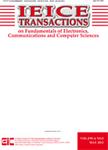版权所有:内蒙古大学图书馆 技术提供:维普资讯• 智图
内蒙古自治区呼和浩特市赛罕区大学西街235号 邮编: 010021

作者机构:Iwate Ind Technol Jr Coll Iwate 0283615 Japan Iwate Univ Fac Engn Morioka Iwate 0208551 Japan
出 版 物:《IEICE TRANSACTIONS ON FUNDAMENTALS OF ELECTRONICS COMMUNICATIONS AND COMPUTER SCIENCES》 (IEICE Trans Fund Electron Commun Comput Sci)
年 卷 期:2002年第E85A卷第6期
页 面:1249-1256页
核心收录:
学科分类:0808[工学-电气工程] 0809[工学-电子科学与技术(可授工学、理学学位)] 08[工学] 0812[工学-计算机科学与技术(可授工学、理学学位)]
主 题:distributed arithmetic LMS algorithm adaptive function space convergence condition offset bias
摘 要:An LMS adaptive digital filter using distributed arithmetic (DA-ADF) has been proposed. Cowan and others proposed the DA adaptive algorithm with offset binary coding for the simple derivation of an algorithm and the use of an odd-symmetry property of adaptive function space (AFS) [3], [5], [10]. However, we indicated that a convergence speed of this DA adaptive algorithm degraded extremely by our computer simulations [6]. To overcome these problems, we have proposed the DA adaptive algorithm generalized with two s complement representation and effective architectures. Our DA-ADF has performances of a high speed, small output latency, a good convergence speed, small-scale hardware and lower power dissipation for higher order, simultaneously. In this paper, we analyze a convergence condition of DA adaptive algorithm that has never been considered theoretically [8], [9]. From this analysis, we indicate that the convergence speed is depended on a distribution of eigenvalues of an auto-correlation matrix of an extended input signal vector [8], [9]. Furthermore, we obtain the eigenvalues theoretically. As a result, we clearly show that our DA-ADF has an advantage of the conventional DA-ADF in the convergence speed.